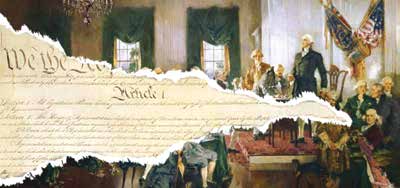
By Andrea Shorter–
Article II, Section 2, Clause 1 of the Constitution grants the President of the United States the power to pardon any person convicted for or accused of federal crimes, except in cases of impeachment. The President may not pardon persons convicted for or accused of violating state or local laws. — The United States Constitution
As President-elect Biden and Vice President-elect Harris begin to form a new government and cabinet closer to the image of the diverse American demographic, Trump tweets out teases and taunts about which next of his fellow criminal enterprising grifter buddies to wave his magic pardon wand over during this final series episode of Reality Bites Back Bigly.

I must confess something: I’d actually like to see this man try to pardon himself. Yes, we’ve totally had enough of the gaudy orange spectacular disaster on his way from the White House and possibly soon to the Big House. We relish his exit from the world’s stage without prolonged voter suppression schemes, spew of lies, cult-crazed conspiracy theories, board stiff combovers, and crazy antics. Still, to pardon himself? Come on—who wouldn’t want to see that?
Obviously, such a final act would be par for course for Trump. No one would put it past him to at least try. That’s his brand. He’s proven fiendishly immoral, unethical, desperate, and just plain crazy enough to do it, right? No surprises here.
Of course, as no person can stand as judge and jury in their own trial before a court of law—the closest absurdity one can conspire in court maybe to either serve as one’s own attorney or hire Rudy Giuliani—the president, therefore, technically, cannot pardon him or herself. In two hundred plus years, self-pardon has never been tried by an exiting president of the United States. Why not? Let’s see. Probably because no one ever imagined we would have an impeached, treasonous, and delusional president facing real life tax-related New York state civil and criminal indictments, charges, and a boatload of convictions once he steps off of Marine One for the last time, and touches toe onto the gated manicured grounds of civilian life at Mar-a-Largo.
The president’s pardon power cannot be used to: (1) pardon state crimes, (2) remove federal civil liability, (3) pardon impeachment, or (4) pardon crimes that have not already occurred.

While pardons only apply to federal offenses, and not state or local matters, the Trump pathology suggest that since it became apparent that he just might win his long shot at the presidency, he has long banked on self-pardon as the ultimate reward, benefit, if not purpose of his presidency. Self-pardon, then maybe exile.
Before he was sworn in, bets were on for how long it would take before he would be impeached. Impeachment definitely happened mid-term. Still, he can’t pardon his own impeachment. I would like to see Trump attempt self-pardon for one reason: it would require that he describe the federal offenses and crimes committed for which pardon can be granted.
From what federal offense could he possibly attempt to self-pardon? At the very least, maybe for violation of election laws, vis a vis his hush money payouts to one Miss Stormy Daniels as arranged by his once loyal and trusty attorney turned fall guy and newly released from federal pen, Michael Cohen. Could it be use of federal property for election campaigning when he took the hatchet to the Hatch Act to commandeer the White House as backdrop, stage, Trump brand promo, and worldwide broadcast of his re-election campaign extravaganza? Surely there are at least two dozen federal violations for which he would be eager to absolve himself in the waning days of his failed one term as the once elected and now not elected leader of the free world.
The Trump pathology would also suggest that, even if he knows that self-pardon would not stick, he could at least put into the minds of his followers that a special gold-plated Trump pardon extends to absolve him of any forthcoming allegations, charges, convictions in any state, any town. After all, that’s more or less in the same vein of recent scammy schemes he’s been hustling per mail-in ballots, rigged elections where he lost—telegraph out what you want people to believe, come up with shady, flimsy tactics to make your projections seem prophetic and true, blame, blame, and cry wolf as loud as possible that you’ve been done wrong by somebody somewhere somehow.
I would like to see in real writing—not a tweet—exactly what committed offenses soon to be citizen Trump would warrant or fancy a president’s self-pardon. But wait … a self-pardon would essentially require an admission of offense, possibly an admission of guilt. Trump’s pathology doesn’t allow for admission of offense, let alone guilt. Therefore, the probability of a Trump self-pardon should diminish to a one in a million long shot just based on what we’ve endured of his pathology of narcissism and self-interest alone.
Above all else, a presidential self-pardon would be confessional. Much like appropriately offering concession in clear defeat, offering confession is the ultimate un-Trump—confession would signify defeat. Based on the facts about pardon, and observations over four years of the dangers of Trump pathologies on full display, I concede and confess: a self-pardoning President #45 seems less likely. Then again, with Rudy Giuliani as his personal attorney and chief exit strategist, who knows? Maybe they’ll be foolish enough to give it a try before the last moving van is packed at the White House and rolls out onto Black Lives Matter Way and onto Florida or … .
Andrea Shorter is a Commissioner and the former President of the historic San Francisco Commission on the Status of Women. She is a longtime advocate for criminal and juvenile justice reform, voter rights and marriage equality. A Co-Founder of the Bayard Rustin LGBT Coalition, she was a 2009 David Bohnett LGBT Leadership Fellow at the Harvard Kennedy School of Government.
Published on December 3, 2020
Recent Comments